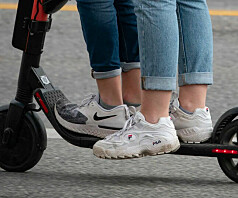
Do women really have a better vocabulary than men?
Are women better at remembering words than men? Researchers in Bergen have now carried out a thorough review of studies on the topic.
Suppose that women and men were given the task of saying as many first names as possible that start with the letter "S". Which gender would win the competition?
Men dominate the public debate, both in newspapers and on TV. Most authors are men.
Nevertheless, it has long been claimed that women are verbally superior, have a larger vocabulary and better memory for words than men. But can this be true?
Contradictory findings
Women perform better in many tests, such as when asked to find as many words as possible that begin with the letter "F", or to find words in a specific category, such as animals or fruit.
It has also been considered fact that women are better at remembering words, according to popular science books.
However, the studies behind these claims have been fairly ambiguous. Some studies have found that women have an advantage, others that men have an advantage. And some have found no differences.
Professor of Cognitive Neuroscience at the University of Bergen (UiB), Marco Hirnstein, set out to get to the bottom of the matter.
Meta-analysis
Hirnstein and his colleagues created a meta-analysis where they analysed all the studies they could find on the topic. Master’s theses, doctoral theses and studies published in scientific journals were included.
The meta-analysis included nearly 500 measurements with over 350,000 participants.
They found that girls and women actually do outperform boys and men. But not by much.
This applies to phonemic fluency - naming words that begin with a certain letter, as well as remembering and recognising words.
The gender difference has remained stable over the past 50 years, regardless of age.
However, when it came to semantic fluency -naming words that belong to categories like fruits and animals, boys and men performed slightly better.
Dependent on the researcher’s gender
Interestingly, the differences vary depending on whether the researcher leading the study is a woman or a man.
Female researchers report greater female advantage in vocabulary. Men report a slightly smaller female advantage.
Published articles showed a stronger female advantage than unpublished studies.
Overall, the studies varied considerably, which the researchers believe is due to the language and country of the participants.
Important for diagnoses
You might be wondering if there is any real importance in establishing whether women are any better at a particular skill.
Hirnstein believes that it is important to establish the average performance for both genders.
For example, when testing for a dementia diagnosis. In such cases it would be advantageous to set the bar somewhat higher when testing women than men. It would give a more accurate picture of the patient’s cognitive state.
Otherwise, if you have gender-neutral tests of vocabulary, you may run the risk of diagnosing too few women. And perhaps more men would be incorrectly diagnosed with dementia if they perform below average.
Many of the tests that are currently in use take gender and gender differences into account, but not all.
Biological or social differences?
Hirnstein is interested in biological, psychological and social factors that contribute to gender differences in cognitive skills. These skills refer to the ability to think, understand and remember.
Gender differences – whether they exist and possible consequences – have repeatedly ignited debates. Such as if women and men have different talents for different positions in society.
Many studies have previously established that boys and men have better spatial awareness (link in Norwegian). They also score better in mental rotation, which is when they have to imagine that they are spinning geometric figures around in their heads.
———
Translated by Alette Bjordal Gjellesvik.
Read the Norwegian version of this article on forskning.no
Reference:
Hirnstein et al. Sex/Gender Differences in Verbal Fluency and Verbal-Episodic Memory: A Meta-Analysis, SAGE Journals, 2022. DOI: 10.1177/17456916221082116
------



































